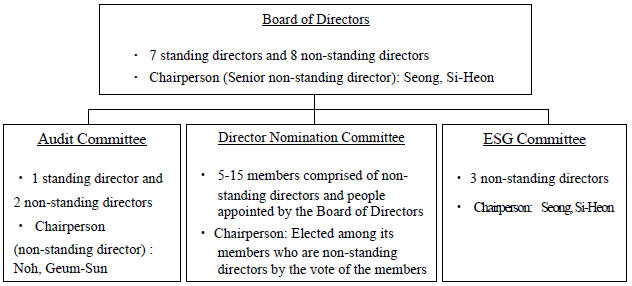1. Corporate Governance Policy
(1) General Meeting of Shareholders
KEPCO regards enhancing shareholder value and protecting shareholder rights as its highest priorities, and, since becoming a public company, has continuously made efforts to uphold a system of corporate governance that reflects its corporate ethos. In that connection, KEPCO plans to further promote the interest of its shareholders through responsible management based on trust and communication and by embedding in its operations a focus on serving the shareholders.
(2) Board of Directors
In order to effect transparency in its corporate governance, anyone interested in KEPCO’s corporate governance practice can access, at its corporate website, Articles of Incorporation of KEPCO, Regulations Concerning the Board of Directors, Regulations Concerning Operations of the Audit Committee and KEPCO’s other internal regulations related to its corporate governance.
To ensure the transparency of its corporate governance through an independent decision-making process, KEPCO operates a majority of directors as non-standing directors. The Board of Directors is composed of seven standing directors including the CEO and eight non-standing directors. The chairperson of the Board of Directors is appointed upon among non-standing directors for fair gathering of opinions and suggestions on the overall management.
Furthermore, non-standing directors are elected from professionals with basis of finance, accounting, labor management, shared growth and energy industries, so as to fulfill ones’ role of consulting and suggesting about the agenda of board meetings.
(3) Audit
The Audit Committee inspects the accounting and management issues, and also evaluates the operation of Internal Control over Financial Reporting. Moreover, it supervises the performance of directors and management to let them make rational business decisions.
The Audit Committee consists of three directors, two of who are required to be non-standing directors. The chairperson of the committee is required to be a non-standing director. One member of Audit committee is a standing director and is appointed with the recommendation of Director Nomination Committee and by the resolution of general meeting of Shareholders. Other members of the Audit Committee who are non-standing directors are appointed from among non-standing directors by the resolution of the general meeting of Shareholders.
